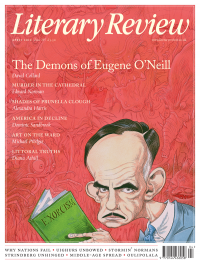Keith Miller
If It Honks like a Swan
The Chemistry of Tears
By Peter Carey
Faber & Faber 273pp £17.99
Peter Carey’s work is, as the travel industry is fond of saying of his native Australia, full of contrasts. His early writing was disjointed and elliptical, nodding towards ‘head’ fiction or even science fiction, at times a little like his English contemporary Ian McEwan during his ‘Gollum’ years. Then came success, and, hot on its heels, middle age; just as McEwan’s writing became somehow sleeker, so Carey seemed to get his feet under the table of an upper-middlebrow readership. He was credited with Anglicising the genre of magic realism (though the laurels for that should probably go to Angela Carter), and – more than once, most recently in True History of the Kelly Gang – with reinventing the historical novel.
I’m not sure if The Chemistry of Tears constitutes yet another act of reinvention, though it is full of an anguished strangeness. It brusquely introduces us to Catherine, a conservator at a fictitious museum of objets d’art, reeling from the death of her married lover, who had been a colleague.

Sign Up to our newsletter
Receive free articles, highlights from the archive, news, details of prizes, and much more.@Lit_Review
Follow Literary Review on Twitter
Twitter Feed
It wasn’t until 1825 that Pepys’s diary became available for the first time. How it was eventually decrypted and published is a story of subterfuge and duplicity.
Kate Loveman tells the tale.
Kate Loveman - Publishing Pepys
Kate Loveman: Publishing Pepys
literaryreview.co.uk
Arthur Christopher Benson was a pillar of the Edwardian establishment. He was supremely well connected. As his newly published diaries reveal, he was also riotously indiscreet.
Piers Brendon compares Benson’s journals to others from the 20th century.
Piers Brendon - Land of Dopes & Tories
Piers Brendon: Land of Dopes & Tories - The Benson Diaries: Selections from the Diary of Arthur Christopher Benson by Eamon Duffy & Ronald Hyam (edd)
literaryreview.co.uk
Of the siblings Gwen and Augustus John, it is Augustus who has commanded most attention from collectors and connoisseurs.
Was he really the finer artist, asks Tanya Harrod, or is it time Gwen emerged from her brother’s shadow?
Tanya Harrod - Cut from the Same Canvas
Tanya Harrod: Cut from the Same Canvas - Artists, Siblings, Visionaries: The Lives and Loves of Gwen and Augustus John by Judith Mackrell
literaryreview.co.uk